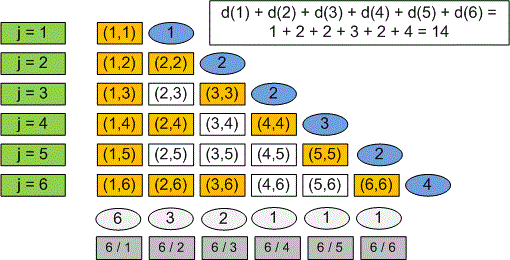Розбір
Let's fix (for example ) and find the number of such that .
The values of that satisfy this equation are . So, any that is a divisor of satisfies the equation .
The number of such for which is equal to the number of divisors of . Since , we need to find the count of all divisors of numbers from to . In other words, we need to find the sum . However, calculating requires factoring the number , so direct computation of this sum takes time.
Let's look at the sum of divisors in a different way. Among the divisors of numbers from to , one appears times, two appears times, and so on (the divisor appears times). The number of required pairs of integers is
This sum can be computed in time.
Example
For we have the next pairs:

The number of pairs is
Algorithm realization
Read the value of .
scanf("%d",&n);Compute the answer using the formula and print it.
s = 0;
for(i = 1; i <= n; i++)
s += n / i;
printf("%d\n",s);Java realization
import java.util.*;
class Main
{
public static void main(String[] args)
{
Scanner con = new Scanner(System.in);
int n = con.nextInt();
int s = 0;
for(int i = 1; i <= n; i++)
s += n / i;
System.out.println(s);
con.close();
}
}Python realization
Read the value of .
n = int(input())
Compute the answer using the formula and print it.
s = 0 for i in range(1,n+1): s += n // i print(s)